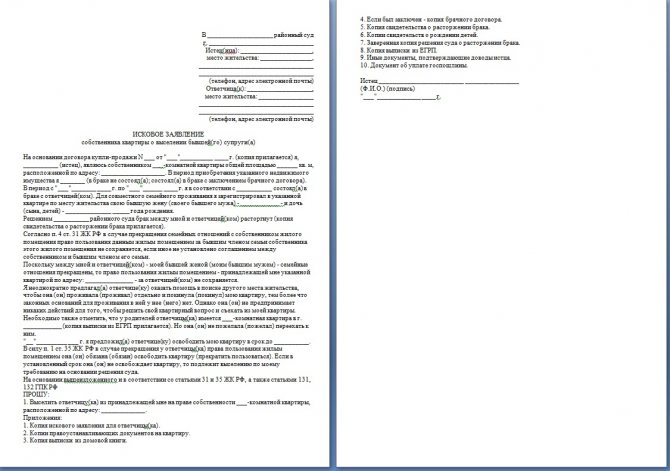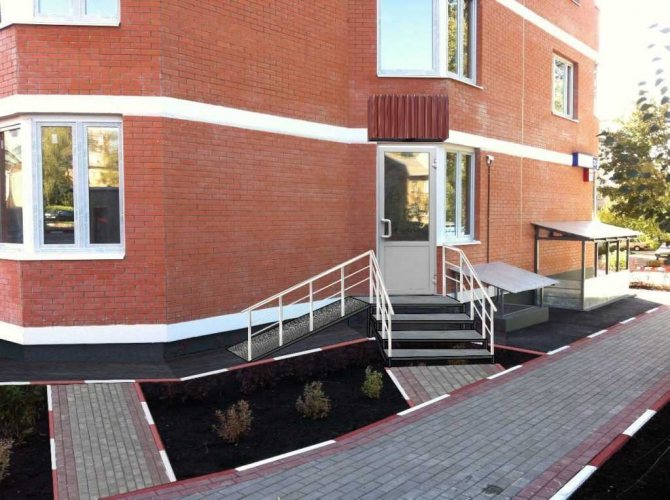Home » Housing disputes » How to evict a person from an apartment if he is registered in it and he is not the owner
14
There are often cases when one person is the owner of a residential premises, and a completely different person lives in it. The reasons are different: someone rented out an apartment, the ex-spouse occupies the living space and does not want to move out, there are situations when a residential property is seized.
In cases where illegally residing citizens do not agree to leave the premises at the request of the owner, they have to be evicted by court.
Is it possible to evict a person from a privatized apartment if he is registered there?
Yes, you can. If the tenant is only registered, but is not the owner, it is much easier to evict than if he owned the premises. But there are also precedents for the eviction of apartment owners.
Of course, eviction occurs differently in different situations. In some cases, evicting a non-owner will not be difficult, in others you will have to put in a lot of effort and spend a lot of time in order to achieve what you want.
The most difficult is the eviction of the following categories of persons:
- minor children;
- incompetent citizens (if their incompetence is recognized by the court);
- disabled people.
How can you evict someone who is not the owner of a residential property in various situations?
From a privatized apartment
The simplest option for eviction is the expulsion of a registered, but not the owner, tenant from a privatized apartment after he has lost the right to live in it.
However, the law prohibits deregistration of a family member of the owner of the apartment, for example, if the spouses have stopped running a household together, that is, they have actually separated, but the marriage has not been dissolved, it will not be possible to evict the non-owner spouse.
When the owner of the property changes
There are situations when the residential premises are sold, the owner has changed, but the tenants who occupied the residential premises before its sale remain registered in the apartment, for example, relatives of the former owner of the square meters or his tenants. In this case, deregistration and eviction of tenants by the new owner occurs without any particular difficulties.
Without agreement
Neither the apartment owner himself, nor the police, nor any other authorities other than the judiciary, have the right to evict a citizen without his consent. In such situations, eviction is possible only after a court decision, and, in especially severe cases, with the involvement of the SSP.
For debts
In this case, everything will depend on the debt itself.
- If a residential property was purchased on credit or with a mortgage, then if the loan payment is late for a long time, the credit institution has the right to initiate the eviction of the debtor through the court.
- If the debt on utility bills (more than six months), then the owner of the residential premises cannot be evicted, but if it is not the owner who is in debt, but his tenant, then eviction is possible.
For example, the Kalinovs entered into a rental agreement with citizen Nefedov, who is the owner of a two-room apartment, and they also temporarily registered in this residential premises. The agreement stated that the spouses would make all utility payments independently.
After some time, Nefedov received a summons to appear in court regarding the management company’s claim for repayment of utility debt. He visited his tenants and demanded payment receipts from them to prove in court that there was no debt, but it turned out that the Kalinovs did not pay their bills, postponing payments until “later.” Nefedov, in the presence of two witnesses, demanded that the Kalinovs leave the premises within two weeks and deregister. The latter refused to move out, since the lease agreement had not yet expired.
Since Nefedov was unable to provide any evidence in court that there was no utility debt, the court ordered him to pay the debt to the Management Company until it is fully repaid.
In turn, Nefedov filed a claim for debt collection from the Kalinov spouses; the second demand was the forced eviction of the spouses from the apartment they occupied.
The court decided to satisfy Nefedov's claims in full.
Features of eviction from a private apartment
A privatized apartment is in the hands of a single owner, and only he has the right to control its fate and decide who is allowed to stay there. The owner can register and discharge possible tenants at his own discretion, as well as completely abandon privatization and transfer the living space to the city.
In practice, situations most often occur when the owner wants to evict one of his relatives from his property, for example, a spouse who has become an ex. At the same time, the owner of the apartment can discharge a man without his consent if he does not own any share of the living space. The former cohabitant will be required to vacate the square meters he occupies immediately after his official eviction.
In fact, the procedure for evicting a registered person from a privatized apartment is identical to evicting a person from a municipal property. However, in this case, the law provides for a private owner more reasons why possible evictions can be carried out, regardless of how many people are registered.
The algorithm for how to evict your ex-husband from an apartment, if he is registered there, is as follows:
- The owner of the apartment must first notify the cohabitant or the entire registered number of people about the need to leave the living space in which they no longer have the right to reside. If the owner can find the right approach to them, the deregistration will be carried out by mutual agreement without any delays.
- According to the law, a non-owner of an apartment can stay on the square meters he occupies during the period while the search for a new apartment takes place. If a registered tenant, who does not have ownership rights to the square meters he lives in, refuses voluntary checkout and does not leave the apartment, its owner goes to court for forced eviction.
- Having received court approval, the owner of the living space has the right to demand that the former cohabitant forcibly vacate the square meters he occupies. The former tenant must leave the place of residence to which he no longer has rights under the law as quickly as possible. Moreover, he must do this voluntarily or with the participation of bailiffs.
Despite the fact that the owner of an apartment has the right to evict his former spouse and even any of his relatives from it, provided that he does not have any share in this living space, he does not have the right to evict minor children.
This action is prohibited even if the children have nothing to do with the ownership of the apartment. The right of residence of children at the place of their registration loses its force only after they reach the age of majority. Nevertheless, there are exceptions in which the discharge of minors is still possible.
We recommend that you read:
Cases of eviction from an apartment for non-payment of utilities
These include the following:
- if the apartment has passed into the hands of a new owner who has no family connection with minor children;
- if the parent of a minor child has been evicted because the social tenancy agreement has been terminated.
However, despite the presence of so-called legal “loopholes” through which it is possible to forcibly evict children under 18 from square meters, in practice it is almost impossible to carry out this process.
In what cases can you evict, grounds for eviction
The grounds for eviction of a non-owner of residential premises are different, but they are all combined into one group: the tenant, for various reasons, loses the right to reside in this residential premises, for example:
- debt for housing and communal services for more than six months;
- antisocial behavior of the resident;
- long-term actual residence in another place;
- expiration of the contract;
- relocation of parents (in case of eviction of a minor);
- the living space is in disrepair;
- inappropriate use of housing;
- transfer of residential premises to another owner (sale of an apartment or transfer of it to the state or municipality);
- dissolution of marriage with the owner of the living space.
For example, Olga and Nikolai Kasyanov entered into a marriage union and the wife moved to live with her husband in his two-room apartment from her communal apartment. Three years later, the couple divorced, but Olga did not want to return to her room and continued to live in her ex-husband’s apartment, citing the fact that she was registered there.
Nikolai, after much persuasion, was forced to go to court with a claim to recognize his ex-wife as having lost the right to reside in his apartment.
The court, having considered all the materials of the case, came to the conclusion that the defendant received the right to live in the plaintiff’s apartment after marriage, but after its dissolution this right was lost. The claim was satisfied in full.
Case practice
The Capital District Court considered a claim regarding the eviction of a person from an apartment that is not his property. The justification for the requirements states that the right to registration was obtained from a person who was declared incompetent.
The court reviewed the case materials and found that the application of the apartment owner authorizing registration was drawn up in October 2016. Based on this document, a certificate of temporary registration was issued, valid for 3 years.
The corresponding act declaring the owner incompetent was issued in September 2021. The plaintiff did not present any other grounds for eviction of the defendant. The claims were rejected , the motivation was that the defendant received the right to reside legally, no compelling reasons were established for his eviction.
Who can and cannot be evicted from an apartment even through court
In each specific case, only the court can decide whether to evict the defendant from the premises or not. The judge bases his decision on the available evidence provided by the parties.
A certain category of citizens, even if they are not the owners of the residential premises, cannot be evicted under any circumstances, these are:
- Citizens who refused to privatize the residential premises in which they are registered in favor of the owner. Such persons have the right to stay in residential premises until the end of their days.
- Minor children who are not owners or co-owners of residential premises, but are registered in it. They cannot be evicted to “nowhere”, that is, if they do not have alternative housing, the court will never order eviction.
- Disabled people of the first and second groups cannot be evicted without providing alternative housing.
- Single mothers with minor children also cannot be evicted without providing other housing.
When can they refuse?
Typically, applications are rejected due to insignificant reasons or simply because the document is simply incorrectly drawn up. But a court decision may be made against the plaintiff if:
- The plaintiff and defendant are relatives, and there are no significant grounds for evicting the latter.
- The person being evicted is a minor, and the other parent does not have the opportunity to register. More information about the eviction of minor children from residential premises can be found here.
- The person being evicted is legally incompetent.
- The evidence for eviction is insufficient or insignificant.
- If the evicted person does not have additional housing in which he can register after eviction (however, in most cases this factor does not affect the court’s decision).
How to evict a person from an apartment if he is registered in it without his consent
If a citizen who needs to be evicted (for any reason) does not agree to move out, then eviction is possible only through the court. In this case, the owner of the apartment or house is obliged to prove that the resident has lost the right to reside in his possession.
The procedure for eviction through court is quite complex; it is necessary to take into account many nuances and follow a certain algorithm.
Jurisdiction
The first thing you need to decide is the jurisdiction of the case. Eviction claims are heard by city or district courts at the place of registration of the defendant. Since the defendant is registered in the residential premises from which the plaintiff intends to evict him, then, accordingly, the claim must be filed in court at the location of the residential premises.
Step-by-step instruction
Having decided on jurisdiction, we move on. So, step by step:
- Sending a written notice to the tenant about the need to leave the residential premises he occupies. If the tenant ignores the owner’s demand, then a judicial solution to the problem remains.
- Drawing up a statement of claim and collecting the necessary documents.
- Payment of state duty.
- Preparation of documents in a single package with the statement of claim.
- Transfer of the claim and the documents attached to it to the court office.
- Participation in all court hearings.
- Receipt of a court decision that has entered into force.
- Execution of a court decision (deregistration and eviction of tenants). If necessary, you can connect the SSP at this stage.
Notice of eviction from an apartment
We found out that the first step to evict an unwanted tenant should be a notification (alert) about eviction from a residential premises with a mandatory period during which the citizen must deregister and leave the premises. Sending such a notice is the responsibility of the apartment owner who intends to evict an unwanted person, otherwise the court will not accept the claim for consideration.
Lawyers do not recommend notifying unwanted tenants orally; the court will not regard oral notification as evidence. The notification must be sent by registered mail with acknowledgment of receipt, the second copy must be kept by the owner of the apartment.
If it is not possible to notify the tenant in this way (he may not go to the post office for a letter or may not allow the postman into the apartment), then the owner of the property must try to deliver the notification personally in the presence of witnesses. As a last resort, you can notify him orally, but in the presence of at least two witnesses who can subsequently confirm this fact in court.
Sample eviction notice
List of documents for the court
Before filing a claim in court, the plaintiff must collect an impressive package of documents, namely:
- Any title document for residential premises.
- Receipt for payment of state duty.
- Utility bills.
- Certificate of divorce in case of eviction of the former spouse.
- If available, police reports on the defendant’s violation of public order.
- Second copy of the eviction notice.
- An inspection report of the residential premises and an independent expert’s opinion on damage to the residential premises. These documents are necessary in cases where the plaintiff intends to evict the defendant because the latter has rendered the housing uninhabitable.
- Some other documents.
Photocopies of the above documents are attached to the claim (except for the receipt for payment of the state duty, it is submitted in the original). The number of copies is determined by the number of parties participating in the process.
State duty
The state fee for a claim for deregistration and eviction is 300 rubles. This amount is determined by law for all non-property claims.
Time limits for consideration of a claim
30 days after the filing of the claim, preliminary hearings on the case are held in court. The judge invites the parties to enter into a settlement agreement, and if the plaintiff and defendant come to a consensus, it is drawn up and signed directly at the court hearing. This is the most time-efficient trial.
But the signing of a settlement agreement does not happen in every case; more often than not, if the matter comes to court, the parties do not intend to stop and give in to each other. Therefore, at the preliminary hearing, the court sets a date for the main hearing, usually one month after the first hearing. There the case is considered on its merits and a court decision is made.
After the court’s verdict, the defendant (or plaintiff, if he does not agree with the court decision) is given a month to prepare and appeal the court’s decision. If the appeal does not occur, the court clerk prepares a writ of execution, which may take two to three weeks.
In total, the legal process from filing a claim to receiving a writ of execution can last from two to three months, unless, of course, one of the parties delays the process.
Delaying the legal process is a fairly common practice in cases where the defendant understands that he will lose in court, but he needs time to find alternative housing.
From private property
How to evict a registered person who is not the owner from an apartment? Everything will be simpler here; the owner can even do without going to court . But more on that later.
He also does not have the right to just take and kick out an annoying tenant - he will first need to notify him in writing (Article 35 of the Housing Code of the Russian Federation).
He may refuse, then a corresponding act is drawn up in the presence of two witnesses.
For voluntary eviction, it is enough to visit the passport office of the Department of Internal Affairs or the Management Company and submit the appropriate application.
If the tenant is against it, then the issue will have to be resolved through the court.
And in the event of eviction from a private apartment, he will be less scrupulous than in the issue of a municipal one. refuse a private owner to remove persons unrelated to him from his territory.
But if the defendant convinces the judge that he has nowhere to go , the servant of the law will give him a month’s deferment to resolve the housing issue. He will be especially strict if the tenant has minor children.
Therefore, in difficult cases, apartment owners often prefer to do the following: they simply sell the apartment with encumbrances (it is clear that the price will be slightly lower) and buy a new one.
Well, the new owner , offering to first clean up in an amicable way (that is, by sending a written notice), and if this does not work, then through the court.
In this case, the tenant is evicted without providing alternatives and usually without any objections (Article 292 of the Civil Code, Article 31 of the Housing Code).
The claim is drawn up according to the same rules as in the case of a municipal apartment. The required documents will require:
- general passport;
- ownership documents;
- extract from the house register;
- evidence of the impossibility or undesirability of a person’s further residence in the disputed territory;
- state duty check;
- correspondence with the tenant.
Claim for eviction from an apartment of a registered person who is not the owner (sample)
Sample statement of claim for eviction from a privatized apartment of a registered non-owner

In the statement of claim, the plaintiff must indicate the following information:
- Details of the judicial authority to which the claim is filed.
- Personal information of the plaintiff and defendant.
- Information about third parties involved in the process, for example, the name of the guardianship and trusteeship authority when evicting a minor.
- The essence of going to court (Statement of claim for deregistration and eviction of a citizen ________).
- A list of the plaintiff's actions to resolve the problem peacefully.
- A list of the grounds on which the plaintiff demands to evict the defendant.
- Evidence that the defendant has lost the right to use housing.
- Demand to de-register and evict the defendant from the living space he occupies. In this paragraph it is necessary to list those legal acts on the basis of which the plaintiff demands eviction.
- Numbered list of attached documents.
- Date and signature.
Reasons for forced eviction

It is quite possible to evict a person from a privatized apartment if he is registered there, but this must be preceded by certain reasons. According to the law, there are only two ways to cancel the registration of housing at the place of residence: through the management company servicing the house, or through the court, if the resident does not agree to be evicted. Most often, alcoholics are included in the latter category, when their consent is no longer required, and the cancellation of registration occurs directly by the owner of the property according to the law.
The reasons for evicting a person from an apartment without his consent are usually the following:
- If a lease or social tenancy agreement has ended, most often this applies to situations where it is planned to evict a registered person from a municipal apartment. Typically, his residence in the property is regulated by the terms for which the agreement was concluded with the municipality.
- An official change in the situation in the family, this may concern divorce, when the former spouse becomes a common partner, or deprivation of parental rights, on the basis of which the spouses can no longer be under the same roof with their son.
- Actions on the part of the authorities, which can be expressed in the simple seizure of an apartment or its transfer to other hands under a debt obligation, or the cessation of the existence of housing as such. On the latter grounds, eviction is usually followed by the provision of alternative housing.
- Any illegal behavior by a tenant that is prohibited by law. This is the basis for evicting a person from a municipal apartment, as well as from square meters of living space owned by a private person. Illegal actions include: utility bills, problems with alcohol, rowdy behavior, violation of the law on silence, and others.
- The grounds for eviction of a registered person from an apartment are completed by dismissal from the position in which he was provided with housing. Usually in this case a municipal apartment is meant, and the person is evicted on the basis of the completion of the employment contract, which stated that he was provided with housing.
Regardless of the reasons why the owner decided to evict the drunkard registered there or people who do not comply with the law from the apartment, he must first notify them of his intentions. You can evict from a municipal apartment by first asking the tenant or a group of registered persons to stop illegal actions.
If the registered persons neglect the owner’s request and refuse to voluntarily leave the municipal apartment, then the case is taken to court. The owner files a lawsuit on the basis of which the alcoholic or unlawful person can be evicted. Based on the statement of claim, the court makes a decision according to which private or municipal housing must be cleared of persons who do not have the right to its square meters.
Features of filing a claim for eviction:
Ex-spouse
Situations often occur when one of the spouses, after registering the marriage, moves into the apartment of the other spouse, who is the owner. in this case, after the divorce, the non-owner of the residential premises ceases to be a member of the owner’s family and loses the right to reside in this residential premises.
But, often, they lose the right, but don’t want to move out. In such cases, the second spouse must act strictly according to the algorithm described above.
And only if the pre-trial actions of the apartment owner did not bring the desired result and the ex-spouse still does not intend to evict, the owner has the right to a judicial solution to the problem.
In this case, in the statement of claim the plaintiff must indicate:
- the grounds on which the defendant was registered in the residential premises;
- during what period the plaintiff and defendant lived together;
- the reasons that led to the divorce;
- the plaintiff’s actions to resolve the problem pre-trial;
- response actions/inaction of the defendant.
Minor child
The court considers claims for the eviction of minors in a special manner and with the mandatory presence in the process of a representative of the guardianship and trusteeship authorities. Claims for eviction of children can be of two types:
- With the provision of alternative living quarters.
- Without providing new housing.
It is mandatory to provide new housing when a minor is evicted in cases where eviction occurs:
- from public housing for any reason;
- families of those killed in the line of duty or military duty;
- orphans;
- due to any illegal transactions with residential premises;
- in case of deprivation of parents of a minor of their parental rights.
Without the provision of alternative housing, it is possible to evict a minor in cases where:
- the rental period for the residential premises has expired;
- the owner plans to sell the apartment;
- parents or guardians have an alternative place of residence;
- if the housing from which the minor is evicted is completely unsuitable for living in it.
Eviction methods
It would seem easy to evict an ex-wife or husband from your own apartment. The person should be reminded of his rights and responsibilities and enjoy the spectacle of furiously packing his suitcases. But if all former partners realized the truth and voluntarily left their home after a divorce, then you would not now be looking for the answer to the question of how to drive away an uninvited neighbor. So, there are two ways to evict former spouses from an apartment:
- Voluntary. Constructive dialogue and a farewell slam of the door - this is the ideal eviction of an ex-partner. After this, it’s not a sin to throw a party, but there are not many cases of voluntary departure of an ex-husband or wife. All decent and conscientious people run away on their own without talking or reminding. And those who are more insolent do not want to lose their free place of residence and look for a new one. And it’s too expensive to remove a corner these days. Therefore, we want to warn you that you should not hope for such a favorable outcome of events. And whoever is forewarned is forearmed.
- Forced. If the ex-husband prefers not to listen to his wife’s monologues about a speedy eviction, and still watches TV casually, scattering sandwich crumbs around, then it’s time to bring in the heavy artillery. Contact the court with a request to forcibly evict the person from your apartment. The ex will receive a couple of reminders from the court, and if he doesn’t get it, gentle bailiffs will come and lead him away.
See also:
How to divide a car during a divorce
Remember that you can only try to evict your spouse from the apartment if you are its rightful owner. If the housing belongs to both of you, you need to divide the property and decide what to do with the property - sell it and divide it, or you will give the value of your spouse’s share in cash.
Procedure for the plaintiff after a positive court decision
The procedure for eviction after a court hearing and a positive decision for the plaintiff is as follows:
- Obtaining a court decision. Occurs after the court verdict comes into force.
- Contact the Federal Migration Service at the location of the residential premises. You must write an application, to which you must attach a package of documents, including: title documents for the residential premises;
- a court decision that has entered into legal force;
- a copy of the apartment owner's passport.
Under no circumstances should you try to evict a tenant from the disputed housing on your own, no matter how much you would like him to vacate the premises as quickly as possible. Only authorized services - the SSP and the police - can use force. It must be remembered that if the plaintiff independently tries to expel the intruder from the apartment, he can easily turn from a plaintiff into a defendant or accused.
For example, plaintiff Korobov, having received a court decision to evict his tenant Mikhailov, immediately went to the apartment and demanded that the latter urgently leave the premises. At the same time, he tried to throw the tenant’s things and household appliances from the fifth floor balcony, as a result, some of the things were damaged, the household appliances were broken, and the defendant suffered a broken arm when a scuffle broke out between him and the plaintiff.
Mikhailov obtained testimony from neighbors, took a certificate from the emergency room about beatings and a broken arm, and conducted an independent examination of the value of damaged and broken things. Then he filed a lawsuit against Korobov for compensation for moral, physical and material damage, which he successfully won.
In the event that the defendant decides not to wait for forceful methods, but decides to obey the court decision, he will only need to visit the FMS and fill out a departure form, and then leave the premises.
Step-by-step eviction of ex-husband or wife
Admiring the face of your wife or husband every day after a divorce is still a pleasure. A nervous atmosphere in such a situation is guaranteed for you, because conflicts are unlikely to be avoided. Have you gathered your strength and are ready to kick your ex-partner out of the apartment? If you are absolutely sure of your decision and you are the sole owner of the property, then you should not continue to endure an unpleasant neighborhood. How to quickly and effectively remain in splendid isolation? We offer you the following algorithm of actions:
- An attempt to peacefully resolve the issue. Constructive dialogue is the best way to evict your ex, but it is not always effective. Try to discuss the problem clearly and thoughtfully, even if you have already done it hundreds of times. Give arguments, highlight the prospect of litigation and threaten with bailiffs. Who knows, maybe right now the husband or wife will realize their mistake, pack their things, call a taxi and give you the keys without scandals.
- Applying to court with a statement of claim. If a person refuses to leave the premises voluntarily, then strict measures will have to be taken, that is, filing a lawsuit in court. First you need to collect the necessary documents: copies of passports, apartment purchase and sale agreements, a copy of the divorce certificate and marriage contract, if any, an extract from the house register and the Unified State Register, receipts for payment of utilities and state fees in the amount of 200 rubles. Then you need to draw up a statement of claim indicating the name of the court, full name of the plaintiff and defendant. The statement also indicates the reasons for the disagreement and their demands. At the court hearing, you must clearly argue your position and present compelling arguments for your ex-lover to be evicted from your home. Surely the defendant will also prepare for the process and find something to counter your claim. The court will listen to both of you and only then make a fair decision.
- Waiting for a court decision. A final verdict usually takes approximately three months. The first two of them are occupied by preliminary hearings, since the defendant often does not appear for hearings. In the last month, the court comes to a final decision and announces it to the plaintiff and defendant, if they are present. Under favorable circumstances (the ex-spouse owns an apartment and has a sufficient level of income), the court usually rules to vacate the property within a week. If a person has nowhere to go and no means of subsistence, the eviction period is extended to 12 months.
- Appeal with the court decision to the Department of Internal Affairs of the Ministry of Internal Affairs of Russia. If your ex is not registered in the apartment and it does not belong to him, then the question of how to evict him should not worry you much. He has no right to live there, which means that the judicial authorities will quickly find justice for him. How to evict a registered ex-husband or wife from an apartment? To do this, you need to go through one more instance and apply with the court decision to the Department of Migration Affairs of the Ministry of Internal Affairs of the Russian Federation (Department for Migration Issues). In accordance with the court order, employees must deregister the person and send a notice of this.
- Sending notice of eviction and its terms. The court and the Department of Internal Affairs of the Ministry of Internal Affairs of the Russian Federation will notify the defendant about the timing of the eviction and all the nuances of this process. When vacating the apartment, the ex-partner needs to remove all of his large items, as well as his pets. He must organize cargo transportation at his own expense.
- Contact the FSSP. The last authority and the toughest are the bailiffs. If even a notice from the court does not encourage your ex-husband or wife to leave your home, contact the Federal Bailiff Service. Then its employees will come and lead the unwanted tenant out under the white hands, and all you have to do is wave after him.
See also:
Valuation of movable and immovable property during divorce: tips, recommendations, generalizations
It’s good if evicting an insolent neighbor does not cause you any particular difficulties. But there are situations when this is quite difficult or even impossible to do. We will now talk about such narrow cases.
Arbitrage practice
In judicial practice on the eviction of non-owners from residential premises, there are various precedents, but the following can be called common to all lawsuits:
- The court most often resorts to such an extreme measure as forced eviction only if there is a malicious violation on the part of the defendant and when irrefutable evidence of his guilt is provided.
- Eviction of minors is kept to a minimum, firstly, because such eviction, especially without the provision of alternative housing, will not be allowed by the guardianship authorities, and, secondly, the court especially carefully considers lawsuits that affect the interests of the child.
Let's summarize.
- The court will allow forced eviction only if there is irrefutable evidence and compelling reasons for eviction.
- The eviction process is possible only by court decision.
- If the defendant refuses to comply with the decision to evict, the plaintiff has the right to resort to the help of bailiffs.
FREE CONSULTATIONS are available for you! If you want to solve exactly your problem, then
:
- describe your situation to a lawyer in an online chat;
- write a question in the form below;
- call Moscow and Moscow region
- call St. Petersburg and region
Save or share the link on social networks
Author of the article
Natalya Fomicheva
Website expert lawyer. 10 years of experience. Inheritance matters. Family disputes. Housing and land law.
Ask a question Author's rating
Articles written
513
- FREE for a lawyer!
Write your question, our lawyer will prepare an answer for FREE and call you back in 5 minutes.
By submitting data you agree to the Consent to PD processing, PD Processing Policy and User Agreement
Useful information on the topic

1
Eviction of citizens from residential premises under a social tenancy agreement
Any resident of an apartment building must comply with certain rules of the hostel and...

3
Eviction from official residential premises
A certain (considerable) category of citizens of the Russian Federation lives in official housing. At…

2
How to kick a tenant out of a non-residential premises
Non-residential premises that can be used for an office, a store, small production...

Privatization of housing, apartments under a social tenancy agreement
Privatization of housing in [current_date format='Y'] for many people remains...

Privatization of an apartment with a minor child
Is it possible to privatize an apartment with a minor child? How is this...

6
Notice, demand, warning about eviction from an apartment
Termination of the right to use residential premises is most often initiated by the owner of the premises....
Is it possible to evict an ex-wife and child?
When you are the owner of a home, driving out your ex-wife will not be difficult. But having a common child radically changes things, since the child has the right to a share of the property of either parent. Also, a minor can live in his father’s apartment, even if the parents have already divorced. This circumstance does not give the ex-wife the right to be there, but if the child is too young (under one year old), then, as a rule, the court takes this circumstance into account in favor of the woman. And then the husband cannot kick her out, and sometimes she is not even allowed to divorce.
During the trial, a decision may be made on the temporary residence of the mother in the apartment of her ex-husband along with the child. Within the established time frame, the woman is supposed to find another place of residence and work. If this is not possible, and the father pays child support, he may be required to find housing for his ex-wife and their common child, which is not inferior in terms of conditions to the current one. This is how the law protects the rights of minors.
If the ex-wife, with whom she has a common child, owns some kind of housing or can be sheltered by close relatives, then the court will most likely side with the husband.
It is possible to evict an ex-wife with a small child, but is it worth doing? It is difficult for a single mother to get a job, and finding a place for a child in a nursery is a real problem. Financial problems are also a big obstacle to finding a rented apartment: you can’t really get around on maternity leave. Try to take a responsible attitude towards the fate of your child and take into account all the circumstances of the situation before going to court.
See also:
Loans during divorce: how are they divided between spouses?








